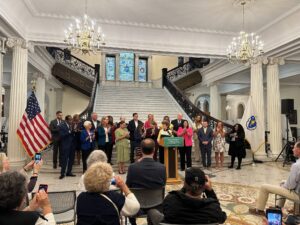One thing that goes hand in hand with our work with nonprofits is constantly paying attention to the legislative cycle in Massachusetts and beyond. These organizations need more funding and support, which results in a continuous push for them to be included in the state budget or move forward bills and acts that are critical to the problems they are trying to solve. It is our job to capitalize on these milestones, whether the legislation moves in our favor or not. We do so by putting our clients at the forefront of these conversations, so when a decision is made on the legislation, reporters understand that these played a key role in working toward solutions.
Here are a couple of recent examples of how we were able to leverage legislative moments for our clients.

BWWC Co-Chair and former Lieutenant Governor Evelyn Murphy speaks during ceremonial signing of the act.
The recent passing of the Salary Range Transparency Act (H.4890) was a crucial moment for the Commonwealth and for our client, the Boston Women’s Workforce Council (BWWC).
The legislation requires employers in Massachusetts, with 25 or more employees, to disclose pay ranges in job postings and provide information for data collection on gender and racial wage gaps. The BWWC has put years of work and research into helping employers in the city find tactical solutions and steps that can be taken to foster an environment and culture of equal advancement. We were able to ensure the BWWC’s data was included in key reporting on the passing of the act, including two mentions in the Associated Press. We prepared a statement, which we shared with key reporters and outlets after the act was passed.

Senator Edward Markey, Teak Team member Jenn Seabolt and me at the sea turtle beach release.
We had the pleasure of assisting the New England Aquarium with a sea turtle beach release with Senator Edward Markey. We were able to leverage the recent movement of the Sea Turtle Rescue Assistance and Rehabilitation Act (S.2086), a bill Sen. Markey introduced to establish a new $30 million grant program at the Department of Commerce to fund institutions in Massachusetts and across the United States in their efforts to rescue, rehabilitate, and research sea turtles. It was perfect timing to include the recent advancement of the bill in our media alert, which we used to invite reporters to the Cape to witness the turtles’ return to the ocean with the help of the Senator. We also emphasized the bill in our post-event press release, which included photos from the event. This led to good on-site attendance and coverage after the fact from outlets including the Associated Press, Boston Herald, Cape Cod Times, WHDH, and more.
As much as we wish we could have all bills pass that our clients are pushing forward, that isn’t always the case. With the end of the legislative session last month, came frustration that an important climate bill didn’t pass. With this unfortunate news, we shared a statement to get The Nature Conservancy included in the reaction pieces on this lack of movement. GBH spoke with the organization’s Director of Policy & Partnerships, who participated in the Governor’s Commission on Energy Infrastructure Siting and Permitting that made recommendations to the bill about delivering clean energy equitably to communities across the state. It is just as important to express disappointment as it is to praise the positive steps.
Good planning leads to good results. It is important to gauge a client’s level of comfort to talk about an issue and create messaging in advance, as legislation can move quickly. You want to be ready, and make sure you aren’t late to the party with your thoughts so they can be included either way. Keep a running tab of the legislation you are monitoring and constantly check the official congress.gov site to see if there is any notable movement that should be brought to light, within the context of the work of your client. As nonprofits gain recognition in this space and speak out, relationships develop with key state legislators who become critical supporters and advocates for the work these organizations are doing. The media is a great place to share those partnerships, thank supporters, and emphasize solutions to the problems.


